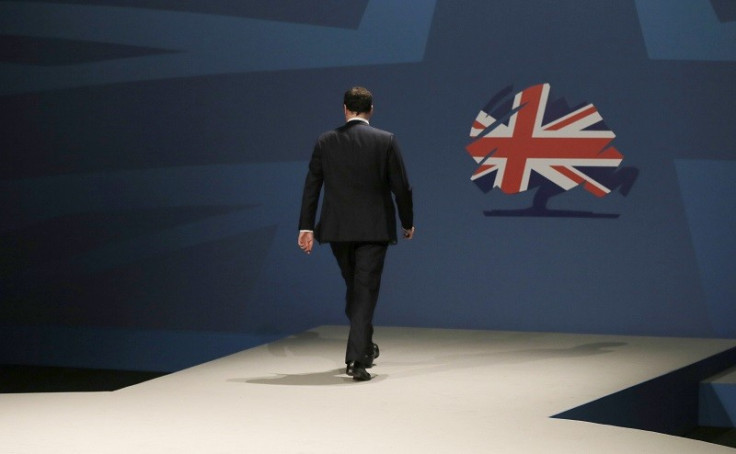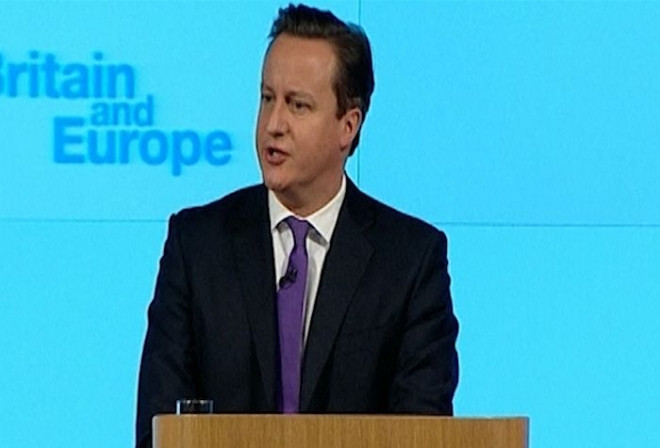George Osborne Risks Overplaying EU Withdrawal Threat

Chancellor George Osborne may be the great political strategist but when it comes to talk about leaving the EU he is in danger of overplaying his hand.
In what was signalled as a significant speech on the EU, Osborne declared that unless other member states went along with the government's reform proposals the UK might pull out of the Union.
His blunt speaking could be interpreted as a direct threat that, without such economic and structural reform, a future Tory government would reach the end of its tether and lead the UK out of the EU.
But it is no such thing. Osborne deliberately did not spell it out but what he means is that, having offered the promise of a future in-out referendum in 2017, if the British people are not satisfied with the reforms he and David Cameron negotiate between now and then, they will vote to leave.
It may look like the same thing, but it is not.

That referendum was only offered as a way of appeasing Tory Eurosceptics and Ukip in a failed attempt to shut down the entire, damaging issue of Europe on the government benches.
Virtually no one believes there is any way, barring some huge unforeseeable crisis, a future Tory government would ever support a campaign for withdrawal from the EU.
Far more likely, should they win in 2015, Osborne and Cameron would claim they had won significant reforms and were now able to recommend staying within the EU.
And they may well win such reforms. There are clear signs that Germany's Angela Merkel is on much the same page as the government and that, in the wake of the euro crisis, there is a genuine commitment to reform amongst EU states.
But can anyone image a future Tory prime minister standing before the British people admitting he had failed in negotiating acceptable reforms and, as a result, was going to lead the "out" campaign"?
Labour, which is also expected to finally come out in favour of a referendum, would also be supporting the "in" campaign.
That, of course, is exactly why the Eurosceptics have refused to remain silent after the referendum concession but have, as expected, simply upped their demands in the belief Cameron has no intention of ever backing a call to withdraw. They want to push him into an impossible negotiating position, limiting his hopes of claiming a victory for his reforms.
The letter from 95 such rebels seeking more reassurances from Cameron gives him a useful weapon to wave under the noses of fellow leaders and claim "look what I am dealing with", and urge them to help him with his reform programme to keep the UK in the club.
The question, though, is whether they will believe him or, more likely, will make their decision based on what they perceive are their own best national interests, which may just happen to coincide with Cameron's of course.
It is also the case that there are some EU leaders who believe there would be far less trouble if the UK was outside the club.
So what Osborne is really up to here is attempting to show his Eurosceptics and the wider public that he is talking tough to Europe while gently reminding the other leaders that they need to give him something to help him appear credible when he claims he has won the reforms needed to back the "in" campaign in 2017.
He is warning it is the public who need to be reassured and, on that, he does have a powerful point. Opinion polls routinely show the public would vote to withdraw, but it is a fragile lead and could easily change after a powerful and politically united "in" campaign of the sort expected in 2017.
In the end, Osborne's negotiating position is far less dramatic than it might appear and, in any case, he is pushing against an already opening door.
As that becomes increasingly clear, however, he can expect more trouble from his implacable Eurosceptic MPs who already smell a pro-EU conspiracy.
© Copyright IBTimes 2025. All rights reserved.






















